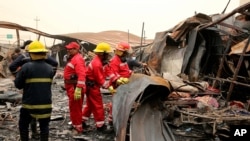Iraqi officials say at least 92 people were killed and more than 50 were injured after a blaze ripped through a coronavirus treatment ward overnight at a hospital in the southern Iraqi city of Nasiriyah. A similar fire tore through Baghdad's Ibn Khatib hospital in April, killing upwards of 80 people.
Hours after the blaze tore through the poorly constructed COVID ward in Nasiriyah, workers continued to sift through the rubble of the destroyed facility to try and recover dead bodies and identify them.
Eyewitnesses told Iraqi media that oxygen canisters being used to treat COVID patients at an annex of the Imam Hussein Teaching Hospital exploded, causing a fire to quickly burn through the facility, leaving few survivors.
Dr. Ammar Zamily, a health spokesman for Iraq's Thi Qar province, where the hospital is located, told Arab media the building that caught fire was "poorly constructed and the blaze spread very quickly throughout the facility."
An unidentified young man wearing a red sports cap told Iraqi media the COVID facility was a "death trap.” he said that when he arrived late Monday night to help pull people out of the fire, he found the doors locked and was unable to get inside the building.
An elderly man expressed his anger at Iraqi government and provincial officials, claiming that a newer Turkish hospital that was officially dedicated last month has yet to accept patients, adding to the tragedy.
An elderly woman who lost several family members in the fire screamed as people in the vicinity of the ruined building tried to comfort her. Many victims of the blaze have yet to be identified since their bodies were badly charred.
Iraqi Prime Minister Mustafa Khadhimi accepted the resignations of the health minister and other top health officials, and is promising a full report on what happened within one week. The Iraqi parliament was also scheduled to discuss the fire Tuesday in an afternoon session.
Iraq's President Barham Salih said in a tweet Tuesday that the hospital fire, along with the fire in April at Baghdad's Ibn Khatib Hospital were caused by “corruption and poor administration among those responsible for the lives of the Iraqi people."
Khattar Abou Diab, who teaches political science at the University of Paris told VOA the corruption that has beset Iraq is indicative of its inability to put together a functioning Iraqi state following the U.S. invasion in 2003.
He said this is not the first such fire, and it is a reminder that no one has been able to put together a cohesive government since the U.S. invasion, as Iran is hampering progress on many fronts.
Corruption permeates the Iraqi system, he added, and despite the $80 billion spent on the electricity grid — enough to light the entire Middle East — the country still suffers from lengthy blackouts.
In addition to the blackouts, which have left large parts of the country in the dark as summer temperatures top 50 degrees Celsius, Iraq also is battling a resurgent coronavirus pandemic. Various political factions also are trying to undermine Prime Minister Khadhimi as October parliamentary elections approach.




